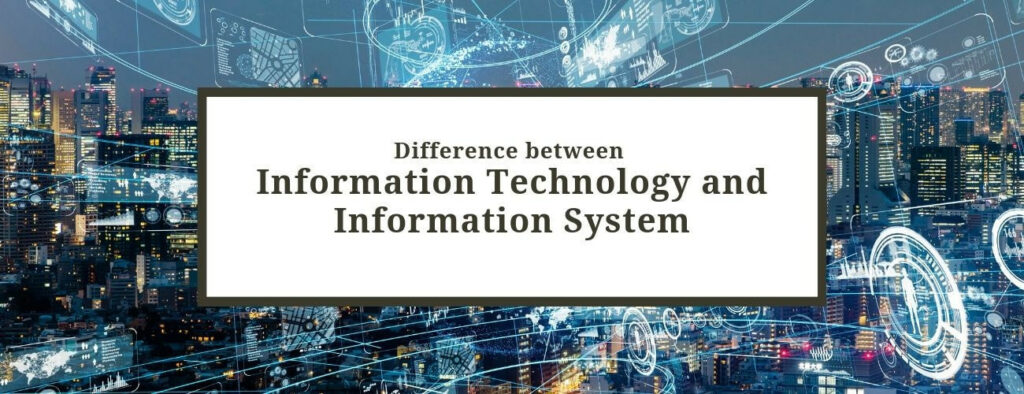You like everything related to computers and information and tend to learn more about software and hardware. You plan to enter college and consider every specialization that has something to do with Information Technology. And before you found these two titles, everything was quite clear. But now you’re lost: what’s the difference between Information Technology (IT) and Information Systems (IS)? Let’s find the answer together.

General Idea behind IT and IS
Though IS, and IT have a lot in common, these degrees differ. Below you’ll find a brief description of each concept.
Information Technology
IT relates to hardware, software, and telecommunications. Hardware includes computers and other equipment that a person needs for its proper usage: monitors, keyboards, mice, scanners, printers, etc. The software component includes all programs that can be installed on hardware –– browsers, applications, firewalls, antiviruses, word processors, and many more. Through telecommunications, information can be transported. Mainly, this can be done with the help of internal and external networks. In the end, IT specialists support users of devices, equipment, software, and networks.
So, Information Technology helps users perform their everyday tasks and reach set business goals. Its efficiency and performance of employees with advanced technology: updating hardware, sorting out issues with the software, and carrying out other activities. This way, IT enhances communication and improves business performance.
Information Systems
IS relates to information that users create, exchange, and spread. Information can be grouped into various systems: operation or ones that support decision-making, or management and executive information systems. IS people primarily work with getting data from servers or the Internet, though they also deal with software and computers.
So, Information Systems are combinations of software products that structure and process data. IS is used to convert raw information into useful insights and organized data. Such data is very advantageous for top management as it helps them make evidence-based decisions. The four main elements of IS are people, task, technology, and structure, and Information Systems primarily work as a link between people and technology. One of the examples of how Information Systems work is the storage of various documents, records, and other information in digital format.
Career Opportunities

Information Technology
Typical job positions of IT bachelors can be:
- Network Administrator
Average payroll: $85,000
Primary responsibilities: create and maintain networks to connect systems and applications.
- Database Administrator
Average payroll: $87,000
Primary responsibilities: store, organize, and secure data and make information quickly accessible.
- Software Developer
Average payroll: $110,000
Primary responsibilities: create and test software codes for various applications.
- Web Developer
Average payroll: $78,000
Primary responsibilities: create and administer websites’ performance and capacity.
Students who obtained an Information Technology bachelor’s degree can work in IT consultancy, health care, retail, transportation, and governmental organizations.
The average salary of an IT specialist varies, and if you certify additional skills, your salary will grow. The most popular IT jobs will relate to big data, cloud computing, cybersecurity, and AI (Artificial Intelligence) during the next few years.

Information Systems
Positions that an IS graduate can get cover many areas. However, since this profession uses technology to get information, you can work in management, computer users support, college, or business spheres. Here are some examples of positions you can get:
- Information Architect
Average payroll: $113,000
Primary responsibilities: set up, optimize, and control information flows between machines and users.
- Information System Manager
Average payroll: $100,000,
Primary responsibilities: analyze cost and value of new technologies implementation, set information standards.
- Business Analyst
Average payroll: $77,000
Primary responsibilities: document business demands to information systems and manage IT teams.
- Business Intelligence Consultant
Average payroll: $93,000
Primary responsibilities: assess current processes in a company and work out recommendations on improving them.
So, what are the main differences between the IS and IT professions? In simple words, people who relate to Information Systems work more with technologies and systems that help businesses, while Information Technology specialists work closely with hardware, software, and machines.
Senior IT Positions
Building a career in IT will bring you even more earnings with time. And after several years of working on middle positions, you can be promoted to top ones. Below are only some of them:
- CTO (Chief Technology Officer)
Average payroll: $173,000
Primary responsibilities: create too-level technology strategies and plans for organizations.
- IT Manager
Average payroll: $109,000
Primary responsibilities: manage IT teams, monitor technical activities, and make technology-related decisions.
- IT Project Manager
Average payroll: $104,000
Primary responsibilities: set and coordinate tasks for IT teams, control budget, and build smooth communication between business and developers.
- IT Director
Average payroll: $144,000
Primary responsibilities: control the IT department in an organization, work out and implement IT procedures and policies, coordinate budgets, and hire employees.
Planning Your Career
Whether you want to build a career in IT or other industries, you need to approach this issue properly. This process requires planning, and here are several steps that can help you.
- Consider your strengths and interests. You need to understand what you know and can do well and align that with what you like or are passionate about.
- Analyze your opportunities. Think about which degree suits you in terms of budget and required time. Also, consider the feasibility of moving to another city to enter a college.
- Set your goals. Draft the preliminary academic plan, salary expectations, and deadlines for changing job positions.
- Act according to the plan. Once your goals are set, start moving towards them and try not to deviate. This is especially important for deadlines as every time you shift them, you postpone your final goal.
Final Thoughts
With degrees in Information Systems and Information Technology, one can get high-paying professions that will always be in demand. And the annual salaries of both positions are very competitive and promising.
Though we can hear these terms used interchangeably, the two fields differ. When IT connects computers and their users to support business processes, IS is more about storing information in digital formats and making data-driven decisions.
So now you know more to decide which specialization and career path to choose.
